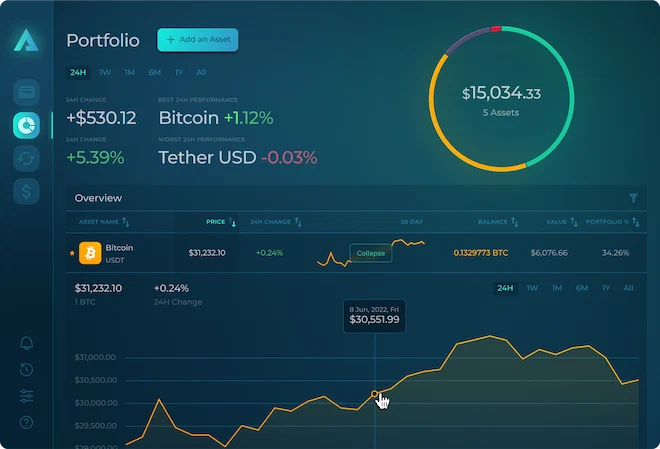Types of Crypto Wallets: How To Choose the Right One?
Nov 14, 2022Do I need a Crypto Wallet?
There's only one correct answer to this — Yes. The world of crypto has already changed the order of things we are used to, and it is impossible to imagine the world of today without it. Plus, the crypto world gets more attractive since it promises us more financial freedom in the face of political and economic instability.
If you decide to join this new world, the first thing you should think about is how to protect your investments. The best way is — a crypto wallet.
Now that we clarified that, let's dive into this beginner-friendly guide to what a crypto wallet is, why you need it, and which ones are worthy of storing your money.
How do crypto wallets work?
Unlike a physical wallet where you store money and cute family photos, your crypto wallet will not literally store assets and NFTs; rather your funds are actually held on the blockchain. In essence, every crypto wallet provides a public address and private keys to access your funds kept on the blockchain.
What types of crypto wallets exist?
| Source: Arctic Wallet |
There are two main types of the crypto wallets:
🔥 Hot storage (software) wallet is basically the wallet that connects to the internet. It creates your private keys online and stores them on your computer or any other device.
Types of Hot Wallets:
→ Desktop Wallet
involves downloading an app to your desktop or laptop.
→ Web Wallet
is a web browser that ensures accessibility for crypto assets from any location with your password, a device, and a web browser without downloading any app.
→ Mobile Wallet
is similar to a desktop wallet. You have to install a mobile app on the phone, which would serve as the hot wallet.
❄️ Cold storage (hardware) wallet is designed for cold storage. It means that the wallet stores the crypto assets in offline mode.
Types of Cold Wallets
Two common variants of cold wallets are paper wallets and hardware wallets.
→ Paper Wallet
is a physical piece of paper with all the data you need for accessing your crypto assets.
→ Hardware Wallet
saves private keys on a physical device in an offline environment and works just like a USB drive. You can connect it to computers or any other device.
Custodial Hot Wallets
At the same time, hot wallets fall into two more categories — custodial and non-custodial ones.
🏦 A custodial wallet is, essentially, an exchange wallet.
- When you purchase crypto through a custodial wallet (exchange) it's going to be stored on that exchange;
- Private keys will not actually belong to you;
- Custodial wallet often demands you to undergo a KYC procedure which is making your personal data vulnerable. So we never consider it as a place to really store funds.
Non-custodial Software Wallets
📲 A non-custodial hot wallet is software that stores wallet private keys on your device connected to the Internet.
Let's check what functions and features non-custodial wallets usually have taking the Arctic Wallet as an example:
- Allows you to store multiple crypto assets (e.g. Arctic has more than 200 most popular tokens);
- Enables cross-chain transactions;
- Includes exchange option;
- Integrates charts to follow the price in real-time;
- Offers lower fees than any exchange wallets;
- Has Mobile, Desktop (macOS, Windows, Linux) apps;
- Ensures privacy as all the data is encrypted and stored on your device, not authority servers.
| Source: ArcticWallet |
Conclusion
Here we go with the most popular types of crypto wallets. If you need to have all functions in one wallet — a non-custodial one will be the best decision for you. Always remember to do your own research on all the details prior to deciding which wallet to trust. Follow the updates of your select wallets as the DeFi industry is moving too fast to catch up. Enjoy navigating the crypto world, it's full of wonders!


